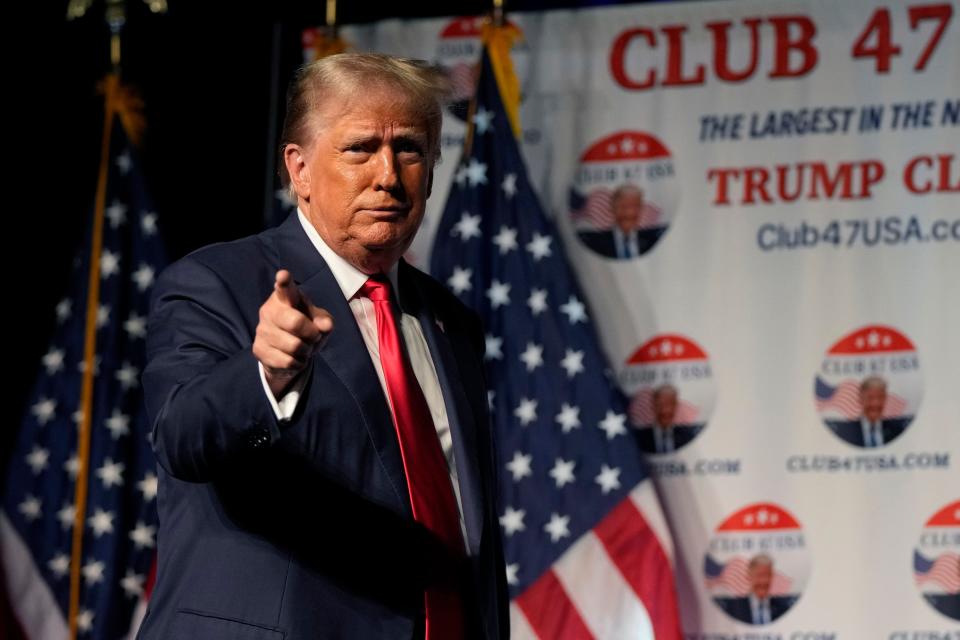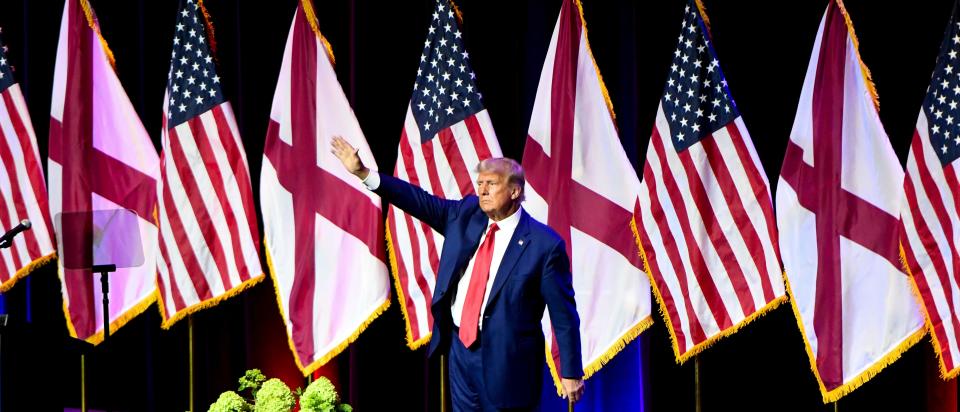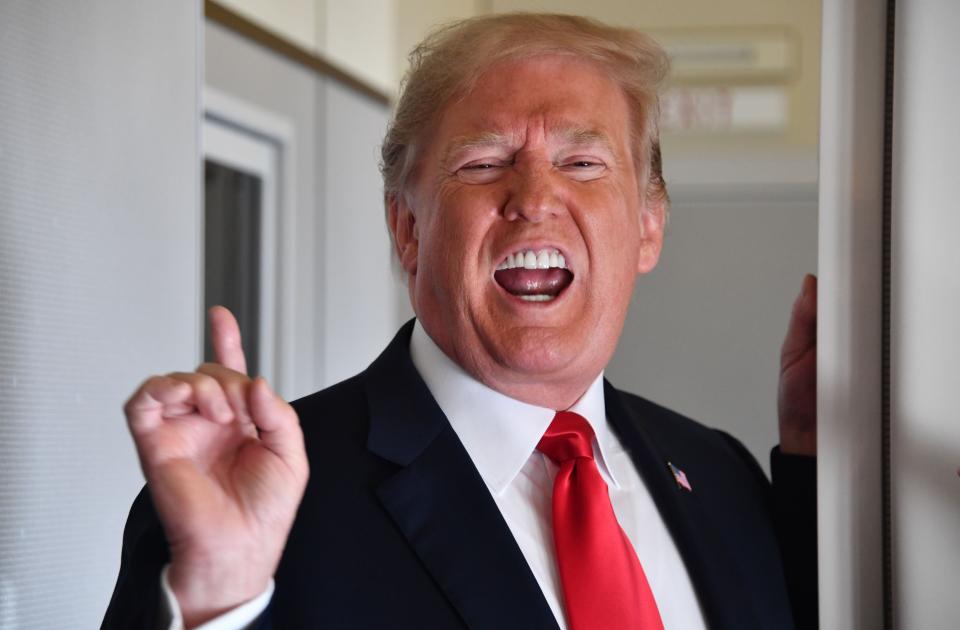Is Donald Trump an authoritarian? 5 reasons the question is debated ahead of GOP primaries
- Oops!Something went wrong.Please try again later.
- Oops!Something went wrong.Please try again later.
Is Donald Trump an authoritarian?
An authoritarian is a political leader who governs by extralegal power and force of will rather than by consensus-building and with respect to rule of law and the legally prescribed role of governing institutions. The conjecture about Trump's intentions, should he win the presidency this coming November, has become a narrative with fewer than two weeks before Republican primary voters start casting ballots at the Iowa caucuses on Monday, Jan. 15.
What has prompted the speculation? Partly it is the attention on the looming third anniversary of the Jan. 6, 2021, attack on the U.S. Capitol.
But mostly, it has been triggered by Trump's own rhetoric on the campaign trail, some of his postings on his Truth Social platform and a court filing by his lawyers in the federal legal case against him in relation to the Jan. 6 insurrection.
So is Trump an authoritarian? Here are five things to know.
Trump's 'Dictator-for-a-day' musing, critics worry, proclaims an authoritarian impulse
The issue arose, actually, in a televised discussion with ally Sean Hannity of Fox News.
During a town hall interview in December, Hannity prompted Trump on the topic by politely asking the polls-leading former president to confirm that "under no circumstances" would he "abuse power as retribution against" another American.
"Except for day one,” Trump replied. “I want to close the border, and I want to drill, drill, drill.”
When Hannity interjected that he was asking about weaponizing government in pursuit of vendettas against political foes, Trump interrupted and spoke directly to the audience.
“He says, ‘You’re not going to be a dictator, are you?’" Trump said of Hannity's question. "I said: ‘No, no, no, other than day one. We’re closing the border, and we’re drilling, drilling, drilling. After that, I’m not a dictator.’”
Then, in a social media post on Dec. 26, Trump shared a curious if not alarming word cloud. The content of the missive purportedly was a poll that asked voters to describe how they viewed Trump's and President Joe Biden's governing plans for second terms.
In the word cloud about him that Trump shared, the nouns and verbs that stood out most were "revenge," "power," "dictatorship," "economy" and "America." They were followed to a lesser extent by "dictator," "border," "corruption," "nothing," "freedom" and "success."
Why Trump shared this image is unknown, but the fact those are words people in a poll associated with a leading U.S. presidential candidate from one of the two major parties is unheard of.
2024 GOP race: How did Donald Trump flip the script on Ron DeSantis? The past 12 months tell the story.
Trump's rhetoric against rivals has been aggressive, threatening
In the last months of 2023, Trump upped the intensity and ferociousness of his political rhetoric, building on his vow to supporters that he would be their "retribution."
Not sufficing with drawing policy distinctions with both Democrats and Republicans, he has labeled his opponents as "communists, far left radicals, Marxists and fascists."
Even his holiday greetings were coated in abrasive phrasing.
On Christmas Day, Trump issued a "Merry Christmas to all" post on his Truth Social site wishing that his political foes, rivals and enemies "ROT IN HELL" and then concluded "AGAIN, MERRY CHRISTMAS!" The post has been "liked' by 30,200 people and shared by another 7,460 since.
The missive was reminiscent of one Trump issued on Thanksgiving Day angrily lashing out at "Radical Left Lunatics, Communists, Fascists, Marxists, Democrats & RINOS" he said are "seriously looking to DESTROY OUR COUNTRY."
Those within his own party who dare criticize him are castigated as "RINOs" — Republicans in name only — in what political observers say reveals Trump's inability to handle even the slightest tinge of criticism.
By contrast, the former president has lauded global authoritarian and totalitarian figures like Russia's Vladimir Putin, China's Xi Jinping and North Korea's Kim Jong Un, as well as the Hamas terrorist organization, for their intelligence. And he has stated and defended his desire for the United States to engage in friendly diplomacy with Putin and Kim specifically.

Trump's 'deep state': Others say it's simply our checks and balances system
The U.S. system of governance is based on so-called "checks and balances," safeguards intended to decentralize power as a guarantee of individual freedom and liberty. Some of those buffers were written into the U.S. Constitution, including the creation of three separate but equal branches of government.
Others have been established by U.S. Supreme Court decisions. Still others were the result of regulatory laws approved by Congress and signed into law by different presidents, starting in the latter part of the 1800s, and which created a professional government bureaucracy over the past 150 years or so.
To Trump and many of his supporters, much of those guardrails amount to the "deep state" — what they believe is a corrupt and elitist political class or establishment whose mission was to thwart Trump's agenda on behalf of the people during his single term in office.
"These Deep State actors are hell-bent on marching your kids into another foreign war, taking away your rights under the Constitution, and leaving America’s sovereignty in question," Trump campaign officials Chris LaCivita and Susie Wiles said in a statement on Jan. 2. "The only thing in their way is President Trump and those willing to stand up, go vote, and be counted."
Then, of course, there is the reminder the nation is about to get on Jan. 6 with observances of the violent attack on the U.S. Capitol. The riot was labeled an insurrection by a congressional committee that accused Trump and his allies of organizing and abetting it to prevent the transfer of power from Trump to Biden.
As a result, pundits and scholars alike say a question before voters as they prepare to cast ballots this year is whether Trump's raging against the "deep state" means that he will govern without regard to the U.S. Constitution, and ignore legal bulwarks and guardrails.

Trump's belief that as president he has immunity and can act with impunity
In a federal court filing just before the Christmas holiday, Trump attorney D. John Sauer wrote that "no President, current or former, may be criminally prosecuted for his official acts unless he is first impeached and convicted by the Senate.”
The argument is counter-historical, as Watergate prosecutor Leon Jaworski and his team were preparing an indictment of Richard M. Nixon in September 1974. That pending action is what prompted then-President Gerald Ford to issue Nixon a pardon, which the disgraced 37th president accepted to avoid prosecution.
Legal and constitutional scholars were aghast at the claim by Trump's legal team. In short, they argued, Trump is claiming he is "above the law" as president.
On Dec. 29, 16 former prosecutors, elected officials, other government officials and constitutional lawyers who served in Republican and Democratic administrations dating to Nixon's White House years filed a brief with the U.S. District Court of Appeals in Washington stating that Trump's position “is inconsistent with our Constitution and would subvert the bedrock principle that no person is above the law.”

They concluded: "To allow a President who has failed to win re-election to leverage his existing power to prevent the constitutionally required vesting of executive power in his successor would endanger one of the most fundamental operations of the Constitution: the peaceful transfer of executive power at the end of a President’s term. Indeed, granting a former President the immunity defendant seeks here would create a perverse incentive for sitting Presidents to engage in misconduct in order to stay in power illegally."
In that statement issued on Truth Social on Dec. 26, Trump declared that his actions following the 2020 election amounted to "my duty as President to expose and further investigate a Rigged and Stolen election," despite the fact that more than 60 court cases filed by Trump and others on his behalf were tossed for lack of evidence.
Still, Trump claims it was his "obligation to do so" and he is "entitled to IMMUNITY," adding that he believes he committed no wrongdoing.
Trump rhetoric: Debate and rally split screen gave viewers sharp contrast between Trump and GOP rivals
Polls say Trump tops GOP rivals, Biden in key states while a study shows Americans wanting 'tough leader'
The speculation about whether Trump is displaying authoritarian tendencies has only seemed to bolster his standing among Republican primary voters.
Trump not only leads his GOP presidential rivals by an average of nearly 50 points, but he is also topping Biden in national and state polls at the dawn of the 2024 primary season.
And a Morning Consult poll that Trump trumpeted on Dec. 27 showed him leading Biden in a crucial series of states.
In that poll, which was released Dec. 14, Morning Consult found that Biden trails Trump in Arizona, Georgia, Nevada, North Carolina, Pennsylvania, Wisconsin and Michigan.
A survey of Americans' attitudes to government released late last month by Allegheny College signals that a broad swath of the electorate, crossing political fault lines, prefer leaders who espouse what researchers on the project called "fundamentally anti-democratic."
Allegheny College researchers Tarah Williams, Andrew Bloeser and Brian Harward wrote in The Conversation that they found "around 90% of Republicans would support tough leaders who crack down on groups that 'undermine American values' — however the survey respondents define those values. More than half of Democrats take the same position. Perhaps even more notably, nearly half of citizens who strongly support the Republican Party and over a third of those who strongly support the Democratic Party endorse the view that it is acceptable to 'bend the rules' for people like themselves to achieve political goals."
Antonio Fins is a politics and business editor at The Palm Beach Post, part of the USA TODAY Florida Network. You can reach him at afins@pbpost.com. Help support our journalism. Subscribe today.
This article originally appeared on Palm Beach Post: Is Trump an authoritarian? 5 reasons why the question is being asked

